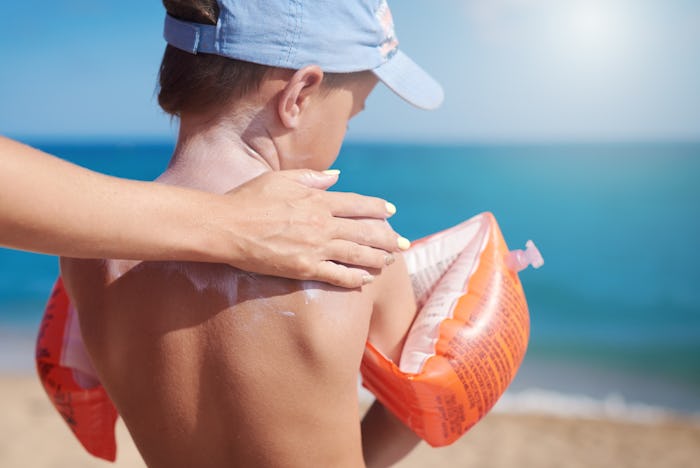Life

Here's Why You Should Seriously Consider Switching To Reef-Safe Sunscreen
Using sunscreen is a responsible thing to do, right? Actively taking measures to protect your skin from the sun's potentially harmful rays definitely falls into the category of successful adulting. Except, it turns out there's one thing about sunscreen that's pretty irresponsible: Some sunscreens contain chemicals that are destroying our coral reefs at an alarming rate; in fact, Hawaii is now banning the use of certain sunblocks as a result. Luckily, there are more and more reef-safe sunscreens hitting the shelves — and they're just as effective as the chemical-laden varieties. But what makes a sunscreen reef-friendly?
First, it's important to understand what makes other sunscreens reef-unfriendly, so to speak. Beginning January 1, 2021, Hawaii will ban the "sale, offer of sale or distribution of any sunscreens containing oxybenzone or octinoxate without a prescription from a licensed health care provider," according to CNN, and with good reason: Oxybenzone and octinoxate, which help to protect the skin from UV rays, have also been shown to cause "bleaching, deformities, DNA damage and ultimately death" in coral reefs. This is naturally a serious problem in Hawaii, where reefs play a crucial role in the marine ecosystem and a heavy rotation of tourists consistently contaminates the water with sunscreen. We're not talking about a little bit of runoff, either — an estimated 14,000 tons of sunscreen are being deposited into the coral reefs around the world, reported Travel + Leisure. When you think about how much sunscreen the average family goes through during a week at the beach (and how many families go on tropical getaways every year), it's not a huge surprise.
The effects of these chemicals almost mimic the damage caused by global warming, as Dr. Craig A. Downs, Ph.D., executive director of Haereticus Environmental Laboratory, told Travel + Leisure.
“Corals would normally bleach when the temperatures are above 31 Celsius [81.7 Fahrenheit] so it’s really warm water,” he said. “[Oxybenzone] will cause corals to bleach at 78 degrees, and that’s non-bleaching temperature.” Disturbingly, this begins to happen in just a couple of hours.
Dr. Downs and his team tested over 50 sunscreen brands before they discovered that oxybenzone and octinoxate are the most problematic chemicals. And they're not just harmful to the enviroment: In addition to causing deformations in juvenile corals and bleaching, Oxybenzone causes damage to human DNA that can lead to cancer and developmental abnormalities, and it's also an endocrine disruptor that can actually turn male fish into female fish. These chemicals have been found at toxic levels in fish, sea turtle eggs, algae, dolphins, shellfish, and human and dolphin breast milk.
Bearing these highly upsetting facts in mind, it's surprising that Hawaii is the first state in the country to pass such a law, as NPR reported (it's actually the first law of its kind in the world). Oxybenzone and octinoxate are used in over 3,500 of the world's most bestselling sunscreen products, including such brands as Hawaiian Tropic, Coppertone and Banana Boat. So if more states follow in Hawaii's lead, the sunscreen industry could be seriously impacted — something many major corporations are already anticipating by developing reef-friendly sunblocks. Edgewell Personal Care, makers of Banana Boat and Hawaiian Tropic sunscreens, issued a statement to Outside when the bill for this law was introduced: “To meet consumer needs, we produce several Banana Boat and Hawaiian Tropic products that are free of oxybenzone and octinoxate.”
Meanwhile, smaller companies are jumping to fill in the reef-safe sunscreen gap with products that use eco-conscious ingredients instead of oxybenzone and octinoxate — though many all natural products are already reef-safe (congrats if you've been skipping these chemicals all along!).
“Some of the stuff happening on the ground is pretty remarkable,” Caroline Duell, founder of the sunscreen brand All Good, told Outside.
“Nonprofits, athletes, and hotels in Hawaii are starting to create their own regulations for what can and can’t be used. That’s really exciting.”
Sadly, there's no way to reverse the damage that's already done, but we can at least do our part to make sure it doesn't continue. And switching sunblocks is about as painless an effort as anyone can make!
This article was originally published on